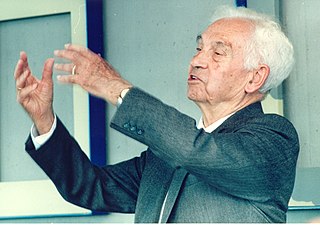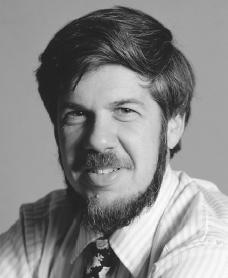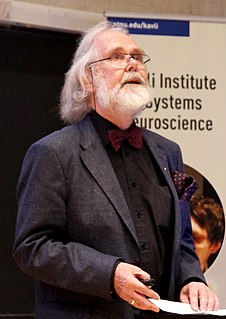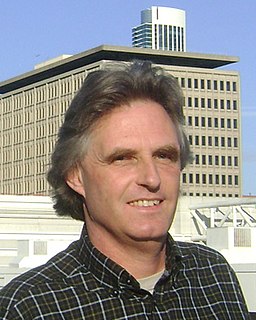Related Research Articles

Ernst Walter Mayr was one of the 20th century's leading evolutionary biologists. He was also a renowned taxonomist, tropical explorer, ornithologist, philosopher of biology, and historian of science. His work contributed to the conceptual revolution that led to the modern evolutionary synthesis of Mendelian genetics, systematics, and Darwinian evolution, and to the development of the biological species concept.
Evolutionism is a term used to denote the theory of evolution. Its exact meaning has changed over time as the study of evolution has progressed. In the 19th century, it was used to describe the belief that organisms deliberately improved themselves through progressive inherited change (orthogenesis). The teleological belief went on to include cultural evolution and social evolution. In the 1970s the term Neo-Evolutionism was used to describe the idea "that human beings sought to preserve a familiar style of life unless change was forced on them by factors that were beyond their control".

Edward Osborne Wilson, usually cited as E. O. Wilson, is an American biologist, naturalist, and writer. Wilson is an influential biologist who on numerous occasions has been given the nicknames "The New Darwin", "Darwin's natural heir" or "The Darwin of the 21st century". His biological specialty is myrmecology, the study of ants, on which he has been called the world's leading expert.

Stephen Jay Gould was an American paleontologist, evolutionary biologist, and historian of science. He was one of the most influential and widely read authors of popular science of his generation. Gould spent most of his career teaching at Harvard University and working at the American Museum of Natural History in New York. In 1996, Gould was hired as the Vincent Astor Visiting Research Professor of Biology at New York University, where he divided his time teaching there and at Harvard.
Zoology is the branch of biology that studies all the animals in the animal kingdom, including the structure, embryology, evolution, classification, habits, and distribution of all animals, both living and extinct, and how they interact with their ecosystems. The term is derived from Ancient Greek ζῷον, zōion, i.e. "animal" and λόγος, logos, i.e. "knowledge, study".
Richard Charles "Dick" Lewontin is an American evolutionary biologist, mathematician, geneticist, and social commentator. A leader in developing the mathematical basis of population genetics and evolutionary theory, he pioneered the application of techniques from molecular biology, such as gel electrophoresis, to questions of genetic variation and evolution.

Martin Andreas Nowak is an Austrian-born professor of mathematical biology, at Harvard University since 2003. He is one of the leading researchers in the field that studies the role of cooperation in evolution. Nowak has held professorships in Oxford and Princeton before being recruited to Harvard in 2003 when Jeffrey Epstein donated a large sum of money to set up a center for studying cooperation in evolution.

Douglas Joel Futuyma is an American evolutionary biologist. He is a Distinguished Professor in the Department of Ecology and Evolution at Stony Brook University in Stony Brook, New York and a Research Associate on staff at the American Museum of Natural History in New York City. His research focuses on speciation and population biology. Futuyma is the author of a widely used undergraduate textbook on evolution and is also known for his work in public outreach, particularly in advocating against creationism.
Stephen P. Hubbell is an American ecologist on the faculty of the University of California, Los Angeles. He is author of the unified neutral theory of biodiversity and biogeography (UNTB), which seeks to explain the diversity and relative abundance of species in ecological communities not by niche differences but by stochastic processes among ecologically equivalent species. Hubbell is also a senior staff scientist at the Smithsonian Tropical Research Institute in Balboa, Panama. He is also well known for tropical forest studies. In 1980, he and Robin Foster of the Field Museum in Chicago, launched the first of the 50 hectare forest dynamics studies on Barro Colorado Island in Panama. This plot became the flagship of a global network of large permanent forest dynamics plots, all following identical measurement protocols. This global network now has more than 40 plots in 22 tropical countries, and these plots contain more than 8000 tree species and 6 million individual trees that are tagged, mapped, and monitored long-term for growth, survival and recruitment. The Center for Tropical Forest Science coordinates research across global network of plots through the Smithsonian Tropical Research Institute. Since 2008, the program has expanded into the temperate zone, and is now known as the Smithsonian Institution Global Earth Observatory or SIGEO.

Nils Christian Stenseth is a Norwegian biologist with a focus on ecology and evolution. He is the director of the Centre for Ecological and Evolutionary Synthesis (CEES) at the University of Oslo. He is also the Chief Scientist at the Norwegian Institute of Marine Research in Norway. In December 2006, CEES was given Centre of Excellence status by the Research Council of Norway.
Ivan Ivanovich Schmalhausen was a Ukrainian, Russian and later Soviet zoologist and evolutionary biologist of German descent. He developed the theory of stabilizing selection, and took part in the development of the modern evolutionary synthesis.

The College of Natural Science (NatSci) at Michigan State University is home to 27 departments and programs in the biological, physical and mathematical sciences.
Paul H. Harvey is a British evolutionary biologist. He is Professor of Zoology and was head of the zoology department at the University of Oxford from 1998 to 2011 and Secretary of the Zoological Society of London from 2000 to 2011, holding these posts in conjunction with a professorial fellowship at Jesus College, Oxford.
Laurent Keller is a Swiss evolutionary biologist, myrmecologist and author. Since 1996, he is professor at the University of Lausanne.
Mary Jane West-Eberhard is an American theoretical biologist noted for arguing that phenotypic and developmental plasticity played a key role in shaping animal evolution and speciation. She is also an entomologist notable for her work on the behavior and evolution of social wasps.

Ulrich Kutschera is a professor of biology who works as an Academic Advisor at I-Cultiver, Inc. in San Francisco and as a Visiting Scientist in Stanford/Palo Alto, California, USA. He is the founder and head of "AK Evolutionbiologie", an association of evolutionary biologists in Germany. Kutschera is critical of creationism and intelligent design.

The following outline is provided as an overview of and topical guide to evolution:

The Department of Zoology, founded in 1860, is a science department in the University of Oxford's Mathematical, Physical and Life Sciences Division.
Amitabh Joshi is an Indian evolutionary biologist, geneticist and a professor at Jawaharlal Nehru Centre for Advanced Scientific Research (JNCASR). He heads the Evolutionary Biology Laboratory at JNCASR and is known for his studies on Genetics and Population ecology. An elected fellow of the Indian Academy of Sciences, National Academy of Sciences, India, and Indian National Science Academy, he is also a J. C. Bose National Fellow of the Department of Science and Technology. The Council of Scientific and Industrial Research, the apex agency of the Government of India for scientific research, awarded him the Shanti Swarup Bhatnagar Prize for Science and Technology, one of the highest Indian science awards, in 2009, for his contributions to biological sciences.
Keith A. Crandall is an American computational biologist, bioinformaticist, and population geneticist, at George Washington University, where he is the founding director of the Computational Biology Institute, and professor in the Department of Biostatistics and Bioinformatics.